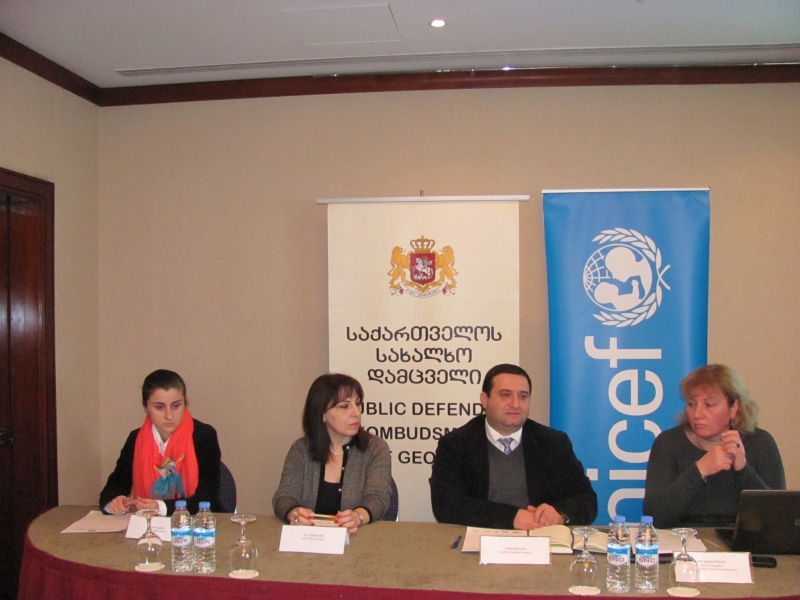Child rights monitoring standards are now available at Public Defender’s Office. The results of the one-year work are summarized by the Child Rights Centre of the Public Defender’s Office and UNICEF
The Child Rights Centre of the Public Defender’s Office will now on be guided by the specially developed standards based on the international best practices, when monitoring children’s institutions. The standards have been developed with UNICEF support within the “Capacity-building of the Child Rights Centre of the Public Defender’s Office” project implemented in 2013. The project has been another phase of the multi-year collaboration between the Child Rights Centre and UNICEF.
Within the project the capacity of the Centre has also been enhanced in monitoring of the juvenile establishments. In particular, during the current year the Centre staff implemented the planned and unplanned monitoring of the Tbilisi No8, Kutaisi No2 and Juvenile No11 Special Establishments. Recommendations are now being developed that will be sent to the Ministry of Corrections and Legal Assistance for further action and will be reflected in the Public Defender’s 2013 Report. The monitoring was focused on the following: living conditions of the juveniles, right to fresh air, disciplinary measures, contact with outside world, rehabilitation and re-socialization, education, establishment personnel, sending-receiving parcels and cash transfers, complaints and applications, hygiene, healthcare and nutrition.
Meetings have been held in the high mountainous areas (Mountainous Adjara, Akhmeta Region and the Pankisi George, and Kazbegi Region) with Child Rights organizations and the government representatives. The meetings aimed to discuss the problematic issues related to child rights in the regions and to introduce the Child Rights Centre of the Public Defender’s Office to the local communities.
Within the project the regional representatives of the Public Defender’s Office have been trained on child rights to ensure prompt response to the child rights violations in the regions.
The representatives of the Child Rights Centre throughout the year have been actively cooperating with NGOs to support ratification of the Third Optional Protocol of the CRC on “Communications Procedures.” The Communications Procedures, often referred to as complaint procedures, allows individuals, groups of individuals and their representatives who believe their rights have been violated by the party state to submit a complaint to the UN Committee on the Rights of the Child for reinstating these rights.
UNICEF has been closely cooperating with the Child Rights Centre of the Public Defender’s Office since establishment of the latter in 2001. In 2010 UNICEF supported the Child Rights Centre in developing the three-year-strategy and action plan.
News
December 13, 2023
Ethnic minorities outside the peace dialogue
November 6, 2023
‘Peace’ agenda of political parties
Popular
Articles
February 13, 2024




